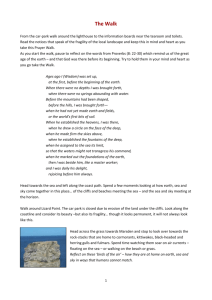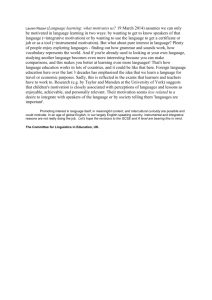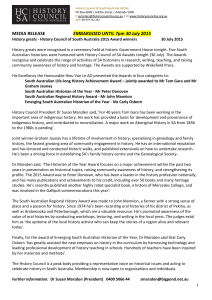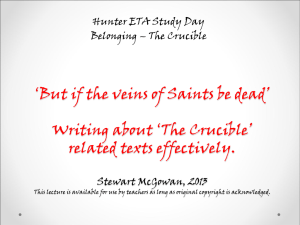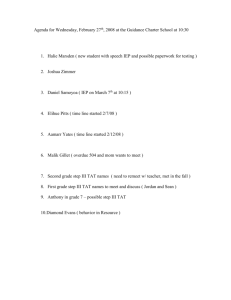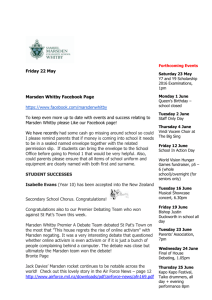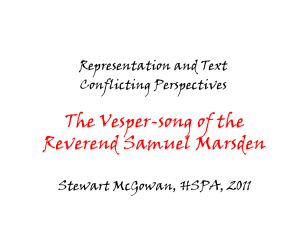2319. marsden lecture oct 2008
advertisement
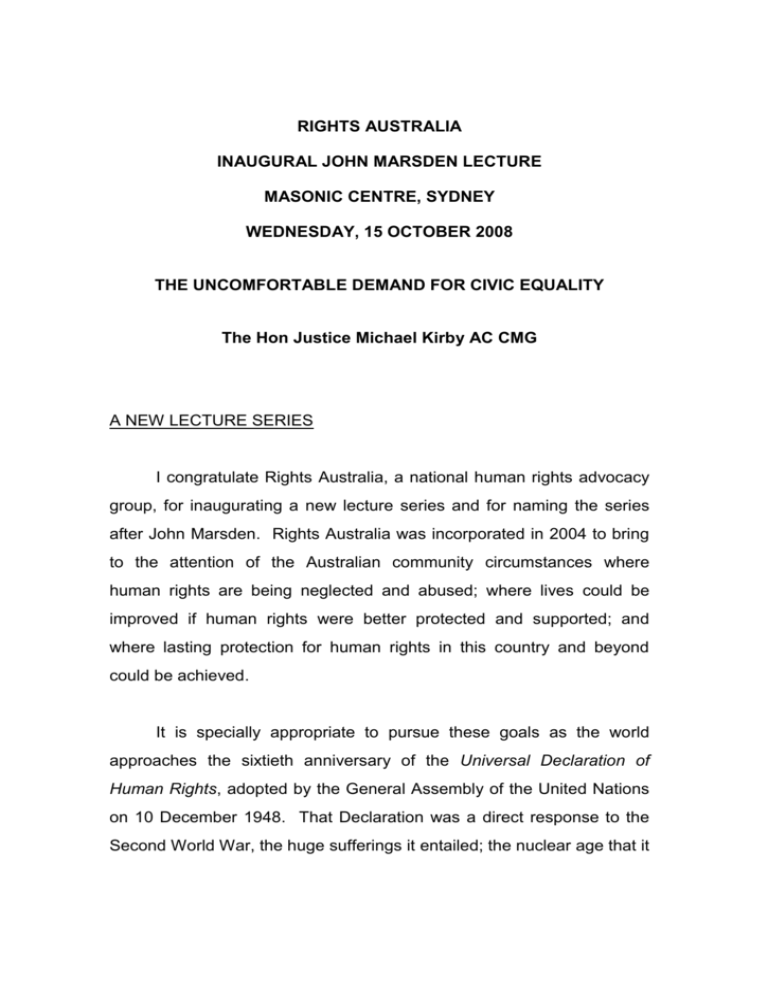
RIGHTS AUSTRALIA INAUGURAL JOHN MARSDEN LECTURE MASONIC CENTRE, SYDNEY WEDNESDAY, 15 OCTOBER 2008 THE UNCOMFORTABLE DEMAND FOR CIVIC EQUALITY The Hon Justice Michael Kirby AC CMG A NEW LECTURE SERIES I congratulate Rights Australia, a national human rights advocacy group, for inaugurating a new lecture series and for naming the series after John Marsden. Rights Australia was incorporated in 2004 to bring to the attention of the Australian community circumstances where human rights are being neglected and abused; where lives could be improved if human rights were better protected and supported; and where lasting protection for human rights in this country and beyond could be achieved. It is specially appropriate to pursue these goals as the world approaches the sixtieth anniversary of the Universal Declaration of Human Rights, adopted by the General Assembly of the United Nations on 10 December 1948. That Declaration was a direct response to the Second World War, the huge sufferings it entailed; the nuclear age that it 2. opened up; and the grim discoveries of the Holocaust and genocide that resulted from irrational hatreds, ignorance and stereotyping. I am glad to be the first lecturer in the series. I will commence with the life of John Marsden. He and his legal firm were (and the firm still is) a strong supporter of the University of Western Sydney and especially its Law School and Campbelltown campus. If all others fail, the inaugural lecturer must demonstrate the reasons why the lecture has been named as it is. For many of us, who knew John Marsden, his vivid, difficult, often combative, questing personality is still fresh in our memories, two and a half years after his death. Other lecturers will come along who did not know him. So it is as well to tell his story. He was not without his flaws, as few of us are. But he was a very considerable achiever. He was courageous and fought tenaciously for civic equality in Australia. That is why the lecture has been named after him. Having laid this ground, I will say something about John Marsden's values. I will seek to identify the chief motive forces that urged him on. Through my voice, I will endeavour to say what he would say about current Australian values, were he still alive. 3. JOHN MARSDEN - THE MAN Early days: John Marsden was born in Lismore, New South Wales, on 3 January, 1942. He was one of six children born to Guy and Tib Marsden.1 He developed an early passion for helping the underprivileged. As a boy, he would collect chokoes to raise money for the starving children of India.2 His collections were small but wellintentioned. He was educated at Catholic boarding schools including St Joseph’s College in Hunter’s Hill, Sydney and De La Salle College in Armidale. Initially, he had ambitions to be a priest. However, after spending years in a seminary, he decided that the priesthood was not for him. Nevertheless, at the seminary, he met John Fahey, later his business partner at Campbelltown and later still the Premier of New South Wales. John Marsden undertook his legal studies at the University of Sydney. He graduated and was admitted to practice in 1966.3 In 1968, he established the successful law firm, Marsdens Law Group, which 1 2 3 Obituary: John Robert Marsden (1942-2006) ‘An outspoken fighter who was passionate until his final days’, Sydney Morning Herald, 19 May 2006 (Obituary SMH). Obituary SMH. Obituary SMH. 4. grew rapidly.4 He built a strong practice in criminal law, and famously represented the convicted murderer Ivan Milat. At the end of his life, he was even reportedly involved at the periphery of the defence of the captured Iraqi dictator, Sadam Hussein. His clients were both underdogs and overdogs. In this, and in other things, he was eclectic. Council for Civil Liberties: John Marsden became a councillor of the New South Wales Council for Civil Liberties (CCL) in 1978. In 1983 went on to be state president for the first time.5 From 1984 to 1986, he was the national president. He only resigned as president of the CCL because of his increasing involvement in the New South Wales Law Society.6 He resumed the position of CCL president between 1993-1997, following the conclusion of his service as president of the Law Society.7 He is remembered by both bodies as a ‘fighter’, who used his connections and amazing drive to organise fund-raising events and to lobby parliamentarians on issues of civil liberty.8 Specifically, he was upfront about using his political connections to try to persuade politicians to decriminalise homosexuality: 4 5 6 7 8 See generally the Marsden Law Group website www.marsdens.net.au. Obituary SMH. K Buckley, ‘Tribute to John Marsden’ Civil Liberty: Journal of the New South Wales Council for Civil Liberties Inc accessible via http://www.nswccl.org.au/publications/civilliberty.php#issue200. Ibid. Ibid. 5. "I can remember lobbying John Fahey when he was in opposition, and Michael Knight, and a number of others … To be quite frank with you, I went to the Parliament and I pulled every friendship string I had. And I meant it."9 In recognition of his service to civil liberties, the CCL in 2003 unanimously voted to make John Marsden a life member. It is an honour bestowed on only two other persons.10 One was the late Ken Buckley whose autobiography Buckley’s was ‘launched’ in Sydney last week. New South Wales Law Society: John Marsden was elected President of the Law Society in November 1991. He held that office until the first Council meeting of the Society in 1993 – a longer presidential term, as he often reminded the councillors, than any other President in recent times. His first Council meeting was awaited with anticipation by the councillors and the Law Society staff. He was bubbling over with plans and ideas which, when distilled, became a programme of 26 new initiatives – nearly twice the number of Woodrow Wilson’s fourteen points for a new world. As David Fairlie, John Marsden’s successor as President of the Law Society, wrote after his death, his: 9 10 Obituary SMH. See K Buckley, ‘Tribute to John Marsden’ Civil Liberty: Journal of the New South Wales Council for Civil Liberties Inc - other life members are Ken Buckley and Mary McNish. 6. "initiatives represented a comprehensive and ambitious program for the Society to undertake in its core areas, as well as in other areas where it had not ventured before, such as his initiative to develop a leading role in social reform. Many of these initiatives produced very successful outcomes. The proposal that the Society and, in particular, the Law Society premises, should become more userfriendly, led to the opening of the second-floor dining room and members’ lounge, which was almost entirely John Marsden’s concept.11" John Marsden was the first President of the NSW Law Society who, during his term, visited all the Sydney “mega-firms”, as he called them, as well as the large corporate and governmental legal offices. This initiative led to much greater involvement by the lawyers of these offices in the work of the profession and the Society. As David Fairlie says: “in other areas, such as the freeing up of legal costing, specialist accreditation and the streamlining of litigation processes, his initiatives led to the successful implementation of these policies in later years.”12 Summarising the remarkable service that John Marsden gave to the Law Society, David Fairlie concluded: "Throughout John’s term, his energy and enthusiasm for the presidency never wavered. He visited all of the regional Law Societies, as well as over 40 law firms. He made nearly 200 speeches, the best of which were always those which were off the cuff, full of humour and personal touches. Nearly all 11 12 D Fairlie, ‘John Marsden – Tribute to man of energy and ideas’, Law Society of New South Wales Journal, July 2006 at 26. Much of this part of the lecture derives from David Fairlie’s obituary. Ibid. 7. councillors and Law Society staff who worked with him at that time, became his friends and remained so thereafter. John Marsden regarded the Law Society presidency as the most important of all the positions he held in his public life. 13 We are all indebted to him for his contribution to the Society and to the profession.14" From at least the early 1990s John Marsden was open about his sexuality. More in horror and amazement than in apparent anger, the Rev Fred Nile MLC said of him: "Mr Marsden also boasted of his homosexual lifestyle … He also openly boasted that he broke the law against the use of marijuana … He even called himself a ‘pot-smoking poofter’.15" Too much information: Because of his ‘in-your-face’ approach, his noisiness and his forthrightness, John Marsden became well-known in the latter part of his life as a ‘colourful gay solicitor’.16 His public airing of details about his personal and sexual relationships was certainly unusual at the time. He just ripped up the code of shame, discretion and silence that had been forced on him by his Church, his schools, his society and his professional ambition. 13 14 15 16 He reached a point where he obviously This is confirmed by his own assessment in J Marsden, I Am What I Am: My Life and Curious Times, Penguin Melbourne, 2004 at 47. D Fairlie, ‘John Marsden – Tribute to man of energy and ideas’, Law Society of New South Wales Journal, July 2006. The Hon Rev Fred Nile, New South Wales, Legislative Council, Parliamentary Debates (Hansard), ‘John Marsden and Judicial Officer’s Conduct’ accessed via www.parliament.nsw.gov.au. K McClymont, ‘Marsden has a final word’ Sydney Morning Herald, 19 June 2006. 8. concluded that the only way to change irrational discrimination was by confronting it head-on. This might cause chaos and angst. But he was in the mood to start forcing his reality down everyone’s throat. All this was part of a deliberate strategy to confront the mental demons of others and to force a healthy dose of reality on society and its law17. In his autobiography, John Marsden is very open about his many sexual exploits.18 He eventually became very proud of his sexuality and regarded it as God-given and hence given for a purpose. Yet, despite this pride, he sometimes manifested deep regret that his reality and relationships could not be as celebrated as he would have liked them to be. In a television interview with Kerry O’Brien in July 2000 he concluded: 17 cf Kenji Yoshino, Covering – The Hidden Assault on our Civil Rights (Random House, 2007), 74-85. The author describes the more common reality of "gay covering" whereby gay sexual identity is suppressed, hidden and betrayed out of a fear of upsetting the majority community. He asks what would happen if women and other minorities were forced to conform to such an extent in denying their reality. 18 See television interview with John Marsden, Solicitor, 20 July 2000, interview by Kerry O’Brien where Marsden stated: “I wouldn’t consider myself not to be promiscuous” (accessable via http://www.abc.net.au/7.30/stories/s154345.htm) . See also J Marsden, I Am What I Am: My Life and Curious Times, Penguin Melbourne, 2004. 9. "If I’d had a button to press – and my gay friends wouldn’t approve of this – I would much rather have been married and had children"19. Attacks in Parliament and the media: John Marsden might have gone on being an irritating burr under the saddle of an often complacent society. However, as we know, his noisiness attracted enemies: "During my years of practising law, I had developed a reputation as a noisy, forthright, sometimes obnoxious advocate that the media seemed to like quoting – just the type people seemed to want to hire to get them out of trouble."20 In December 1994, events began to unravel. An ALP frontbencher in the New South Wales Parliament, Diedre Grusovin, under absolute privilege and apparently without notice to him or due process, named John Marsden as being involved in a paedophile ring. She based her allegations on an affidavit by Colin Fisk, a known offender. The speech ended her political career. Colin Fisk quickly retracted his statement. The then State Police Minister hastened to say that John Marsden’s name was not among the list of “persons of interest” to the police.21 For a while, at least, the allegations seemed to go away. However, the storm was only beginning. 19 20 21 Television interview with John Marsden, Solicitor, 20 July 2000, interview by Kerry O’Brien (accessable via http://www.abc.net.au/7.30/stories/s154345.htm). J Marsden, I Am What I Am: My Life and Curious Times, Penguin Melbourne, 2004 at 79. Obituary SMH. 10. In March 1995, the Today Tonight programme of Channel Seven television in Sydney broadcast interviews with two young men who claimed that John Marsden had had sex with them when they were 15 years old.22 A year later, Channel Seven aired a similar allegation on its Witness programme. In his autobiography, John Marsden reports: “[t]he telephone began to ring at midnight: on the other end were people playing nursery rhymes, people calling with blackmail threats.”23 The defamation action: John Marsden was left with a choice to sue the broadcaster for defamation, or do nothing and hope that the storm would subside. Another option was to commit suicide as other persons who had been named in Parliament proceeded to do: “[I could] just have drowned into a sea of oblivion and not gone ahead with it”, he said.24 But John Marsden was not the type to surrender. Those who knew him and had met his friends and his sexual partners over the years never believed that he had a sexual interest in underaged boys. He thus resolved to take on one of the most powerful broadcasters in the nation. 22 23 24 Obituary SMH. J Marsden, I Am What I Am: My Life and Curious Times, Penguin Melbourne, 2004 at 19. Television interview with John Marsden, Solicitor, 20 July 2000, interview by Kerry O’Brien (accessable via http://www.abc.net.au/7.30/stories/s154345.htm). 11. John Marsden’s civil action for defamation against Channel Seven was a battle that would last some 9 years.25 It became “without doubt the largest, longest and most comprehensive defamation case in the history of Australia.”26 With the benefit of hindsight, it can be said that John Marsden chose the option that would ultimately cost him more stress and heartache than any other decision in his life. Eventually he was successful, recovering damages of $525,000 and costs of millions of dollars.27 However, his ‘success’ in court could arguably only be described as a financial success. During the course of the defamation litigation, John Marsden undoubtedly said more in public than was necessary or prudent, including a statement that he had “never knowingly” had sex with a boy who was underage.28 As Richard Ackland put it: "This has been a sort of battle to the death and with enormous costs and repercussions for both sides. I think it is a particularly foolish way for someone to seek to establish, 25 26 27 28 See J Marsden, I Am What I Am: My Life and Curious Times, Penguin Melbourne, 2004 at 20. Television interview with John Marsden, Solicitor, 20 July 2000, interview by Kerry O’Brien (accessable via http://www.abc.net.au/7.30/stories/s154345.htm). Obituary SMH. Obituary SMH. 12. or re-establish their reputation after it’s been savagely attacked.29" Yet John Marsden would have replied: what other way was there? How else could he find vindication against accusations that he totally denied? Must a citizen, faced with false claims, simply roll over and go on as if nothing has happened? Would the law provide him no redress? Especially so when, as the trial judge eventually found, the broadcaster has “maliciously and recklessly” published grave allegations that he was a pederast?30 John Marsden’s involvement in his defamation case ironically turned the tables on him. The lawyer became the litigant. This was not sport, a contest, a game to be won. This was a duel of monstrous proportions that soon took on a life of its own. The entire episode caused John Marsden to lose much of his earlier faith in the legal system. He said many times that, as a consequence, he lost a great deal of respect for the law.31 The extent to which his legal battle is traced in his autobiography (the details of the proceedings and the emotions surrounding them make up close to half of the book) reflects the 29 30 31 Television interview with John Marsden, Solicitor, 20 July 2000, interview by Kerry O’Brien (accessable via http://www.abc.net.au/7.30/stories/s154345.htm). D Dalton, ‘The Haunting of Gay Subjectivity: The cases of Oscar Wilde and John Marsden’ in K Biber and M San Rogue (eds) The Trouble with Pictures (vol 10) University of Wollongong (2006) 10 LTC 72 at 86. Ibid. 13. profound impact that the struggle against Channel Seven had upon him personally. Once a solicitor who put great faith in the law, John Marsden found that the saga left him dispirited about the capacity of the non corporate litigant, even one as well-off and experienced as himself, to take on a big corporation in a quest for vindication: "... I always thought law was about seeking the truth. I’m now convinced that we’ve lost that. The duty of a lawyer is firstly to the court, but it now seems to the client to win. And I’ve lost a lot of respect for the law.32" The stress that John Marsden was placed under during, and after, the legal battle was, I believe, a significant factor contributing to his deteriorating health and ultimate death. Illness, travel and death: Following Justice David Levine’s verdict in favour of John Marsden an appeal was lodged by Channel Seven. Mercifully, the litigation was settled. Both sides were exhausted and, to some extent, damaged. Both had been criticised by the trial judge. Channel Seven has gone on to considerable financial success. However, human beings are more fragile. deteriorated. John Marsden’s health His famous noisiness was quietened somewhat. He began to lose weight. He became more subdued. He came to realise that he was dying. For a man who so loved life, he commenced a cruel journey. 32 Ibid. 14. For some years before to his death, John Marsden had begun waging a lengthy war against advancing stomach cancer. Despite warnings to the contrary, and defiant as ever, he travelled to Istanbul in early 2006. He was determined to stick to his policy of never quitting. Asked if this was a wise thing for him to do at that stage of his illness, John Marsden said: "Yes, I am worried about my lack of strength and yes, I am worried about things that can happen but if you are going to stop in this big wide world, then you may as well stop and give up – and I don’t stop and give up. That has never been my policy.33" Unfortunately, John Marsden’s body did not have the same determination as his spirit to journey on. On 18 May 2006, whilst on holiday in Turkey, he died. His body was returned to his beloved Campbelltown for funeral and burial. It then emerged that John Marsden had been preparing for his death for some time. Indeed, he had drafted a 37-page order of service for his funeral and Requiem Mass. It offered detailed instructions as to what should be said; who should attend; and also what should be placed in his coffin – a bottle of whisky, amyl nitrate and a marijuana joint.34 The 33 34 K McClymont, ‘Turkey is as good a place as any to die: solicitor’s journey ends abroad’, Sydney Morning Herald 19 May 2006. Ibid. 15. last was one last thumbing of the nose at what he regarded as a silly law. Whether his wishes were fulfilled in this respect was the subject of conflicting news reports. John Marsden’s actions in life (and even in death) stirred the pot. Some admired him and saw the best of intentions in his actions. Others saw him as an arrogant lawyer who drew attention to himself in order to promote self interest and who wilfully defied the law. Many would agree on his rather apt description of himself in his funeral order of service. It was expressed with his usual charming modesty and understatement: "I have been described as tough, arrogant, noisy and outrageous, over the top, mega ego – but a tenacious fighter for what I think is right.35" John Marsden said in his autobiography, he and I were not close friends in life.36 Our personalities were too different – the north and south of Ireland, I suspect. But like many others I came to value and admire his energy, his courage and his determination to confront homophobia wherever it might appear and to try to change the way Australian society looked on, and treated, sexual and other minorities. 35 36 Ibid. J Marsden, I Am What I Am: My Life and Curious Times, Penguin Melbourne, 2004 at 325. 16. JOHN MARSDEN’S VALUES Family and religion: It was difficult to get far into a conversation with John Marsden without coming to know his family and his religion. He was very close to his siblings and their children. Had he lived he would be mourning the death of his brother, Peter Marsden, whose recent passing was another blow to the Marsden family. He was also very loyal to the Catholic Church, the denomination of Christianity in which he had been raised. There is something of an irony in the conduct of this inaugural lecture in the Masonic Centre in Sydney. There is no getting away from the fact that John Marsden was conflicted by the discovery of his homosexuality and of the teachings of the Catholic Church on that subject. The Catechism of his Church has two instructions on the topic. The first is that homosexual acts are disordered and involve an inclination to intrinsic evil. The second is an instruction that homosexuals, as such, should not be the subject of discrimination because of their inclinations. Like many before and since, John Marsden struggled to reconcile these apparently conflicting instructions. It pained him that he was ultimately unable to achieve the resolution. This was because, in truth, the two instructions are irreconcilable. An inclination to "Intrinsic evil" is, after all, a strong condemnation. In earlier centuries, before modern psychological, genetic and other studies, human beings and their institutions, could be forgiven for 17. believing that the cohort of the population who were inclined to sexual conduct with members of the same sex was very small in number; offensive to the apparent biological purpose of sex; and deliberately defiant of society's moral norms. Such beliefs help to explain Church interpretations of scriptural texts; the resulting invention of serious criminal offences; and the revulsion in "decent" society that rendered "unnatural offences" and "crimes against nature" so horrible that they could not even be officially named and were often capital offences demanding the extreme penalty of death37. Even before the advances in modern knowledge, following the research of Havelock Ellis, John Addington Symons and Sigmund Freud38, philosophers such as Jeremy Bentham and John Stuart Mill had argued that the criminal laws against homosexuals exceeded the legitimate interest of a modern state and should be repealed. The forces demanding repeal of such laws were strengthened following the publication of the research of Dr Alfred Kinsey in his two reports: Sexual Behaviour in the Human Male (1948) and Sexual Behaviour in the Human Female (1953)39. Whilst some of Kinsey's 37 See W N Eskridge Jr, Dishonourable Passions: Sodomy Laws in America 1861-2003 (Viking, 2008), 112, citing W Blackstone, Commentaries on the Laws of England (1765). 38 H Ellis, Sexual Inversion (1915) quoted in Eskridge, 113. 39 Eskridge, 110. 18. sampling methods can be criticised by reference to later developments in statistical techniques, he was obviously onto a very important discovery. His lifetime research into the behaviour of bees (gall wasps) was suddenly turned into a taxonomy of human sexual behaviour. Because he discovered that there was a permanent and not trivial cohort of human beings who throughout their lives were exclusively oriented towards sexual desire and activity with their own sex, Kinsey and those scientists who followed him, made it clear that the law’s attempted imposition of compulsory heterosexual desire would not work; was grossly intrusive into the private domain of those affected; was oppressive and counter-productive; and was destructive of human lives, official honesty and the proper deployment of the authority and resources of the state. Informed people know this now. But it was not known everywhere in the world. Indeed, most of the countries of the former British Empire still cling to the sodomy laws that criminalise [usually] male homosexual orientation. It is a disgrace that this relic of colonialism is not only preserved in the laws of more than thirty Commonwealth countries (only developed Commonwealth nations having repealed the old laws). Some nations, like Nigeria and Zimbabwe, have actually stepped up the terror that is targeted at their homosexual minorities40. 40 M D Kirby, "Lessons from the Wolfenden Report - A Methodology for Homosexual Law Reform in the Commonwealth" (2008) 34 Commonwealth Law Bulletin 551. 19. If John Marsden were alive, he would be urging us to lift our voices to tackle this remnant of colonialism which, like the death penalty, persists in many Commonwealth countries, supposedly bound together by mutual respect for human rights. The Commonwealth Law Conference in Hong Kong in April 2009 has invited me to address the assembled judges and lawyers of the Commonwealth on this theme. John Marsden’s spirit will be with me on that occasion. Whereas in some countries the criminal laws have been repealed and reformed, the root cause for the animosity and hostility to homosexual people remains the teachings of religious leaders. The pain that John Marsden felt over the teachings of his Church is translated in many countries, including sometimes our own, into violence, blackmail, hatred, stigma and discrimination. Sometimes I would quietly suggest to John Marsden that he might think of converting to Anglicanism. I pointed to the doctrinal similarities to his own Church and the fact that the Anglican Church was struggling towards full inclusion in its ministry and hierarchy of women and gays. The path is rocky, but at least the journey has begun. The South African Anglican Bishop Desmond Tutu, in a foreword to the auto-biographical 20. work by Bishop Gene Robinson (the first openly gay Bishop of the Anglican Communion), declares41: "Many of us were engaged in the anti-apartheid struggle. Apartheid, crassly racist, sought to penalise people for something about which they could do nothing - their ethnicity, their skin color. Most of the world agreed that that was unacceptable, that it was unjust. I joined the many who campaigned against injustice that the Church tolerated in its ranks when women were not allowed to be ordained. They were being penalised for something about which they could do nothing, their gender. Mercifully, that is no longer the case in our Province of the Anglican Communion, and how enriched we have been by this move. I could not stand by while people were being penalised again for something about which they could do nothing their sexual orientation. I am humbled and honoured to stand shoulder to shoulder with those who seek to end this egregious wrong inflicted on God's children". Attempted inducements to Anglicanism were to no avail. John Marsden was a loyal son of the Roman Catholic Church. Anyway, he was not convinced that the Anglicans would budge on this issue. He pointed, with some justice, at the occasional narrowness of the Sydney Diocese. He continued to believe that Rome, together perhaps with Campbelltown near Sydney, were the two great cities of the world. When I pointed to the irreconcilable tension between loving the homosexual and hating their acts (and the demand for lifelong celibacy 41 Bishop Desmond Tutu, Foreword in Gene Robinson In the Eye of the Storm - Swept to the Center by God (Seabury, 2008), ix. 21. which Freud declared to be the most unnatural of all sexual inclinations), John Marsden could see my logic. However, he would not budge. My partner Johan van Vloten urged both of us to come over and join him on the ‘dark side’ – convinced as he is that all religions are oppressors of women and gays and in the past have defended slavery and other indefensible conduct. For people who thirst for spiritualism, the animosity towards homosexuals on the part of many religious leaders seems ignorant in the light of contemporary scientific knowledge. To demand lifetime celibacy of ordinary people with no vocation for it was neither possible nor desirable for John Marsden, me or millions of a same-sex orientation. Those who demand this response need to face the truth and reality of their own sexual lives and desires. As John Marsden realised, eventually something had to give on this issue. It will not be scientific truth. It will require a rereading of scriptural texts, just as legal texts have been reconsidered when they come up against science and universal values. In the meantime, a lot of pain will be caused to people like John Marsden. The very fact that he poured so much effort into his funeral service indicates the thirst he had for acceptance by his Church. That acceptance did not fully come in his lifetime. But it will come in due course because the nature of humanity demands that we face facts and rationally accommodate ourselves to them. Rejection of and by religion is not the only path. 22. Civil Liberties: Having thrown so much of his energy, creativity and imagination into the work of civil liberties in Australia John Marsden would, I believe, be heartened by moves that are anticipated to stimulate a national debate concerning the better protection of human rights in Australia. The national policy and platform adopted by the Australian Labor Party before the last federal election commits the government to "a process of consultation which will ensure that all Australians will be given the chance to have their say on [how best to protect human rights and freedoms] for our democracy"42. It is expected that this consultation will unfold, beginning in December 2008. It will give Australians a rare opportunity to consider, and to seek agreement about, an issue important for their governance. Already the opponents are lifting their voices in opposition to any such development. Some media commentators have attacked the idea and even the conduct of a consultation. If one is so powerful that it is unnecessary to respect the rights of others to their honour, reputation and privacy (because there are no adequate or effective laws to protect 42 Australian Labor Party, 2007, National Policy and Platform set out in J Hatzistergos, "A Charter of Rights - Or a Charter of Wrongs?" (2008) 20(2) The Sydney Papers 103; cf M D Kirby, "An Australian Charter of Rights - Answering Some of the Critics" (2008) 31 Australian Bar Review 1. 23. them), it is perhaps natural to oppose any chance that our laws might be developed and adapted to give a voice to such values. It is not usual, in our form of society, to leave powerful interests to judge their own responsibilities and liability, freed from the judgment of a court or other independent official. Yet that is what many of the media opponents think is the only acceptable state of the law on such topics. It is not so in most societies of the world. Nor is it self-evident that it should remain so in Australia. At the very least, it seems apparent that we are not wasting our time talking about it. The opposition of sections of the media sounds like special pleading to defend their own particular and powerful interests. The only model for protection of human rights in Australia that is now on the table for discussion is a model derived from legislation enacted twenty years ago in New Zealand43, largely copied ten years ago in Britain44 and since substantially copied in the Australian Capital Territory45 and Victoria46. This model does not involve providing judges with a power to invalidate laws found to be in breach of a charter of 43 Bill of Rights Act 1990 (NZ). See L McNamara, Human Rights Controversies - The Impact of Legal Form (Routledge-Cavendish, 2007), 129 ff. 44 Human Rights Act 1998 (UK). See McNamara, 119. 45 Human Rights Act 2000 (ACT). 46 Charter of Rights and Responsibilities Act 2006 (Vic). 24. rights nor to declare them unconstitutional. The most that a judge can do under such laws is to attempt (so far as they can) to interpret a challenged law to conform as closely as possible with the stated fundamental rights. If this endeavour fails, all that the judge can then do is to draw the apparent inconsistency to the notice of Parliament. The members of Parliament have the last say. To impartial observers, this would seem to be a fairly sensible way to stimulate the parliamentary process. That process is today sometimes captured by party political interests, powerful lobbies and substantial economic forces. Giving people access to the courts and a chance to stimulate the lawmaking process in Parliament seems, on the face of things, wholly compatible with Australia’s democratic system. Only those intolerant of the initiatives of vulnerable individuals and groups would be dismissive of such a modest proposal for reform. A system of government in which power is concentrated in the hands of winning political parties and the very few people who now take part in such parties may not want to share power with others - least of all independent-minded courts. So far the model of the English legislation has worked well47. At the very least, it is something that Australians should study and 47 Lord Walker, "What Difference can a Human Rights Charter Make?" (2007) Victorian Bar News, Spring 2007, 44; cf J Welch, "Lessons from UK Human Rights Act: The Good, Bad and the Ugly", The Australian, 6 June 2008, 34. 25. consider. It is a privilege to be consulted on the issue. If John Marsden were alive today, he would support the consultation process. Doubtless, he would have some very blunt things to say about leaving media standards to be decided effectively by the media themselves. Civic equality: Another journey that has begun follows a period of inactivity in Australia, in part because of the absence of a human rights charter that speaks up for individual entitlements to equality in the enjoyment of basic civic rights. In 1992, in Leeth v The Commonwealth48, a question arose before the High Court of Australia as to whether a guarantee of equal treatment of individuals under the law was implicit in the Constitution. By a narrow margin (4 Justices to 3) the Court held that it was not49. That decision has not been re-opened during my service on the High Court. In all truth, it is probably as well that this is so because the High Court as presently constituted would seem most unlikely to embrace the implication urged in Leeth's case. Unlike many constitutions in the world today Australia’s, drafted in the 1890s, contains no explicit guarantee of equality for all persons 48 (1992) 174 CLR 455 at 483, per Deane and Toohey JJ, 501 per Gaudron J; see contra at 466 per Mason CJ, Dawson and McHugh JJ and at 475 per Brennan J. 49 See N O'Neill, S Rice and R Douglas, Retreat from Injustice: Human Rights Law in Australia (2nd ed, Federation, 2004), 476. 26. under the law. Under our system of law, the achievement of equality is therefore left to elected Parliaments. The unequal treatment of Aboriginal and other indigenous people. The unequal treatment of Asian Australians during White Australia. The continuing unequal treatment of women under the law in some respects. The unequal treatment of homosexuals by our law. There is no prospect that all of this will change any time soon. The adoption of a principle of equality in a charter of rights would not alter this position. The most that it would do would be to address attention to instances of inequality under the law, and to bring them to the attention of Australian courts. To enjoy a happy, loving, conjugal human relationship is, for any person, a great blessing. It is one that I have enjoyed for nearly forty years. Although John Marsden had close and loving (and some prolonged) relationships, he did not quite achieve the long-term relationship he yearned for. This was probably no one's fault. As we know, many heterosexual relationships break down. This is so despite the reinforcement of legal marriage; the birth of children; the glue of family expectations; and shared economic obligations. Until the 1990s, most gay people simply accepted that this was the way things were and always would be. A sign of changing attitudes arose in a decision of the Court of Appeal of New Zealand in 1998 in 27. Quilter v Attorney-General50. The case had been initiated following the adoption by the New Zealand Parliament of the Bill of Rights Act of 1990. The Act forbade discrimination on enumerated grounds, including sexual orientation. Three lesbian couples challenged the refusals of local registrars of marriages to issue marriage licences to them. They argued that limiting the application of the Marriage Act 1955 (NZ) to opposite sex couples was inconsistent with their basic civic and legal rights to equality. They asked the New Zealand court to read the Marriage Act in a way that would remove the discrimination. The New Zealand Court of Appeal rejected the claim. The majority of the Court of Appeal held that the common law definition of marriage was reflected in the Act. It was a permanent union between a man and a woman. Any change to that rule had to be made expressly by Parliament. It could not be read into the statute by a court. The majority expressed no concern over, nor much sympathy for, the arguments of the applicants. Justice Edwin Thomas, on the other hand, disagreed. He found a clear case of discrimination. He said51: 50 Quilter v Attorney-General [1998] 1 NZLR 523. See also the important book by Professor Luke McNamara: Human Rights Controversies: The Impact of Legal Form (Routledge-Cavendish, 2007). 51 [1998] 1 NZLR 523 at 536-537. 28. "… Based upon … personal characteristics, gays and lesbians are denied access to a central social institution and the resulting status of married persons … They are denied a basic civil right in that freedom to marry is rightly regarded as a basic civil right. They lose the opportunity to choose the partner of their choice as a basic civil right of all citizens. In a real sense, gays and lesbians are effectively excluded from full membership of society". In the end, Justice Thomas identified the discrimination he found. He drew it to the notice of the New Zealand Parliament. He did not feel entitled to alter the intended operation of the Act. But he did conclude that the Act discriminated and was not equal. Ultimately, his dissent was picked up by the New Zealand Parliament. In 2004, it enacted a Civil Union Act. This provides, in New Zealand, for relationship recognition, with ceremonies if so desired, which is separate but equal to that of marriage. When the Quilter case was decided in New Zealand, I must admit that I thought that Justice Thomas had gone too far. Which all goes to show that the perception of legal questions (and especially when affected by social conditioning) depends very much upon timing and personal experience. As time has passed, the reasons of Justice Thomas in New Zealand seem much more persuasive. I now think he was right. Denial of the civil status of marriage to homosexual citizens involves discrimination. And it does so for myself. Under the Judges' Pensions Act, a spouse (or even a de facto heterosexual spouse) is fully protected by the judge's pension if the judge dies. This is an important benefit and protection of office. Thus, 29. whilst marriage (and de facto marriage) involve duties, they also afford important rights and privileges. If I, who knew this discrimination personally, did not recognise as recently as 1998 the merits of Justice Thomas's legal analysis, how can I blame others in society who have no equivalent insights and complain endlessly that "gays will never be satisfied until they have everything"? Defining "everything" is something that will change over time. Since 1998, many countries, especially in Europe, have adopted either marriage or civil union laws to protect the civic rights of same-sex couples. If my partner and I were domiciled in the Netherlands, his land of birth, marriage would be an option available to us. So it is also in several European States including Spain, no less. The Government of Prime Minister Jose Luis Rodriguez Zapatero secured the enactment of equal rights to marriage. John Marsden himself could not have written a more direct, plain-speaking and powerful speech than that given by Prime Minister Zapatero of Spain in support of this marriage law: "We are not legislating … for people far away and not known by us. We are enlarging the opportunity for happiness of our neighbours, our co-workers, our friends and our families. At the same time we are making a more decent society, because a decent society is one that does not humiliate its members. Today Spanish society answers to a group of people who, during many years, have been humiliated, whose rights have been ignored, whose dignity has been offended, their identity denied and their liberty oppressed. Today's Spanish society grants them the respect they deserve, recognises their rights, restores their dignity, affirms their identity and restores their liberty. 30. It is true that they are only a minority, but their triumph is everyone's triumph. … Their victory makes all of us … better people. … There is no damage to marriage or the concept of family in allowing two people of the same sex to get married. To the contrary, what happens is that this class of Spanish citizens gets the potential to organise their lives with the rights and privileges of marriage and family. There is no danger to the institution of marriage; but precisely the opposite". Notwithstanding religious denunciation and constant protests about the new marriage law, the Zapatero government was returned in the subsequent general election. The Spanish marriage law draws a distinction between weddings and marriages. Weddings in churches and temples need not be performed by their personnel if contrary to the religious laws applicable there. But marriage is a civil and legal status. It has legal consequences. In a secular state, the Spanish people decided, it must be available for all persons equally, without discrimination. In Canada, the achievement of the availability of marriage for same-sex couples was the result of an extended dialogue between the courts and the legislatures.52 Between 2003 and 2004 key appellate court decisions were handed down in British Columbia, Ontario and Quebec involving rulings based on the Canadian Charter of Rights and Freedoms. In each of the cases, the court concerned ruled that the traditional restriction of marriage to opposite-sex couples was invalid 52 See L McNamara, Human Rights Controversies - The Impact of Legal Form (Routledge-Cavendish, 2007) 31. because it was inconsistent with the equality guarantee in section 15 of the Canadian Charter. In the British Columbia Court of Appeal in Barbeau v British Columbia53, Justice Prowse concluded: "… Redefinition of marriage to include same-sex couples … is the only road to true equality for same-sex couples. Any other form of recognition of [their] relationships, including the parallel institution of [civil union or civil partnership], falls short of true equality. This Court should not be asked to grant a remedy which makes same-sex couples 'almost equal', or leave it to governments to choose among lessthan-equal solutions". After the third of the Canadian decisions in Ontario in June 2003 in the case of Halpern54, Prime Minister Jean Chrétien announced that the Federal Government would secure the enactment of legislation to define marriage to include same-sex couples. The draft legislation was first submitted to the Supreme Court of Canada for constitutional scrutiny. The Supreme Court55 concluded that the confinement of marriage to opposite sex couples was not consistent with the equality guarantee in the Charter. The Civil Marriage Bill was then adopted in 2005. Although the Harper Government of Canada promised to review that law, no measure was introduced during the last Parliament to repeal 53 Barbeau v British Columbia (Attorney-General) (2003) 13 BCLR (4th) 1 (CA) at [156]; Halpern v Canada (Attorney-General) (2003) 65 OR (3d) 161 (OCA). 54 (2003) 65 OR (3d) 161 55 Reference re Same-Sex Marriage; M v H [1999] 2 SCR 3 (SCC); L McNamara (above) at 106, 118, 132. 32. the reforms. The debate appears to have quietly receded. Once rights are granted, it becomes more difficult to retrieve them and to deny them to fellow citizens. In the United States of America, appellate courts in Massachusetts and California56 have likewise upheld the right to equality in marriage; as has the Constitutional Court of South Africa.57 At this moment, a proposition is before the voters of California to overturn the decision of the Supreme Court of that State extending marriage to samesex couples. Proposition 8, which would have that effect, has the support of the Republican Presidential candidate John McCain. It is opposed by the Democrat candidate, Barack Obama and also by the Republican Governor of California, Arnold Schwarzenegger. Reportedly, the Mormon Church of America has donated no less than $5 million to support the opponents of same-sex marriage58. Little wonder that many gay people feel alienated from the religions of their childhood and convinced that many religious people are haters of their gay neighbours, family and friends who unrealistically demand celibacy 56 57 Lockyer v City and County of San Francisco 95 P3d 459 (2004) Minister of Home Affairs and Another v Fourie and Another [2005] ZACC 19; 2006 (3) BCLR 355 (CC) (1 December 2005) 58 Washington Blade, 19 September 2008, 16. 33. of them which they will not exhibit themselves; and promote discrimination and inequality so far as their rights are concerned. In Australia, legislation is presently before the Federal Parliament to rectify the discriminatory provisions in a large collection of federal laws.59 However, relationship measures lag behind. Marriage is prohibited by amendments introduced into the Marriage Act as a "wedge issue" in the heat of a federal election campaign two elections back.60 Even civil unions are, it seems, a bridge too far. The relationships of same-sex couples can only be registered - rather like a dog or busker’s licence. I hope that fellow citizens of good will who think upon this will not be surprised if many homosexual people in long-term loving relationships say politely to this differentiation: "Thank you; but no thank you". For my partner and me, the issue of marriage – and even civil union – is not particularly important. After all, we have survived for forty years and have come through good and bad times together without marriage rings. We have seen improvements achieved in the law. We honour those, mostly heterosexual people, who have brought about 59 60 See for example Family Law Amendment (De Facto Financial Matters and Other Measures) Bill 2008 and Same-Sex Relationships (Equal Treatment in Commonwealth Laws Superannuation) Bill 2008. See Marriage Amendment Act 2004 (Cth) inserting s5(1) and s88EA into the Marriage Act 1961. 34. such changes through the parliamentary process, especially recently. Yet a question remains that is one of principle. It will not go away. It is the question that has been addressed by the highest courts in New Zealand, Canada, South Africa and States of the United States and by legislatures in Spain, the Netherlands, Belgium, South Africa and elsewhere. Acknowledging the right of religions to do as they please in their own spaces, upon what principle is a legal civil status allowed to some citizens but denied to others. In a secular nation how can such a denial be justified, except by history or religion? History alone is not a good enough explanation. Miscegenation laws until 1967 denied marriage to people of different races in parts of the United States until the decision was struck down by the Supreme Court. The Nuremburg laws in Germany denied marriage between Aryans and Jews until the heroic effort of war ended the cruel regime. The law can do what it pleases, subject to constitutional and human rights. So we have not seen the end of this debate in Australia. Nor, to paraphrase Churchill, have we seen the beginning of the end. But we are in the midst of the end of the beginning. The direction of history, at least in countries like our own, seems to be in favour of the abiding principle of the equality of citizens of all ages, races, colours, creeds and sexualities. If John Marsden were alive, he would not be saying these things in solemn and temperate tones. He would not be referring to court cases or overseas referenda. In his inimitable way, he would be jumping 35. up and down, banging the table, sputtering with anger and demanding equal rights. EPILOGUE In the 1990s, In his inimitable way, John Marsden would often telephone me and endeavour to persuade me to be more outspoken and confrontational, just like himself. Instead, Johan and I took our time. It is at least open to question whether, had we done as John Marsden urged, I would have been appointed to the High Court in 1996. When I retire from the High Court of Australia early in 2009, I trust that future candidates for appointment, and Justices who are appointed, would see their sexual orientation as a matter of indifference. Likewise, the appointers, their colleagues, the profession and society. happens, it will because of change-agents like John Marsden. If this The uncomfortable reality of life is that, in a society such as ours, change comes about because of those who are difficult and sometimes annoying in fundamental things. Change is rarely achieved by quietly begging or praying for it. Sometimes it is secured by people who are 'in your face'. People who confront others and lay claim to the words of insult such as "queer", "faggott" and "pot smoking poofter". Just so that others will think afresh. This is what John Marsden did all the time. No doubt he sometimes said and did things that went over the top. Not infrequently 36. he gave us more information about his life, real and fantasy, than we truly needed to know. Sometimes he made life difficult for his family. Often he made it impossible for his friends and work colleagues. But in the best Australian tradition, he stirred the possum. He made a difference and, taken as a whole, his contributions to our society were as notable as they were beneficial. After his passing, things might have become a little calmer. They were certainly less interesting and less adventurous. It falls to us who are left to sustain the adventure. RIGHTS AUSTRALIA INAUGURAL JOHN MARSDEN LECTURE MASONIC CENTRE, SYDNEY WEDNESDAY, 15 OCTOBER 2008 THE UNCOMFORTABLE DEMAND FOR CIVIC EQUALITY The Hon Justice Michael Kirby AC CMG

